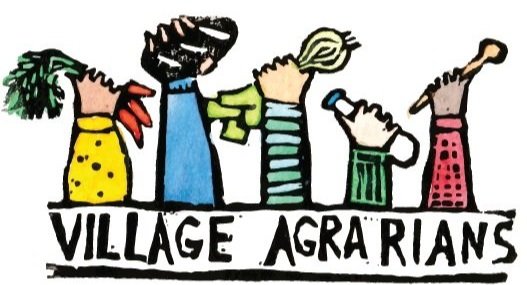This season we were lucky to connect with Alison Bentley from Tikitere Farm . She produces hazelnuts and beef in Rotorua and has spent the last year doing research into local food systems. Find out more about her work below, and if you're in the area, support her small business!
How did you get into farming?
Generational - as long as we can trace back my family has grown food. Initially it was feeding the family, then in my parents' generation different members of the family became farmers in business, industrial farmers by default. But my father chose to discontinue use of herbicide in his crop about 25 years ago.
Growing food for the family alongside commercial production is still strong within our family. Two of my daughters are supplementing their purchased food from potted gardens in their rental accommodations :)
I have diversified. I have a small beef farm and a small hazelnut orchard with commercial intent. Also I have two separate mixed fruit orchards, a subtropical corner (north-facing, southern sheltered slope micro climate) and a house vege garden.
I usually grow enough kumara to keep the family going for most of the year, one year I tried scaling up to sell kumara.
What do you like best about farming?
Working with nature - nature is truly amazing when you take notice!!
What do you find to be the hardest part?
1/ Consumers (or "eaters") are very disconnected with food - real produce food (not the processed substances often called food!).
I couldn't sell my kumara because they were "too big" - sure they were the size of small pumpkins, but everyone cuts a pumpkin ... so cut a kumara too ... apparently not!!
I hear people want food traceability, local, etc but because my beef is from a small seasonal farm I don't have continuous supply, the price is a little more, the butchery cuts are not exactly consistent etc ... so people stick with their supermarket habits - their actions are not where their words are!
The effort for me as a small producer, to educate / tell my story / market / my produce destroys the business equation.
2/ The status quo "food system".
It's incredibly hard for growers of fresh produce to operate financially sustainable businesses unless they are producing on a scale acceptable by the supermarket supply chain.
The "system" is a commercially driven, dominating, engine.
New Zealand is so focused on food exports that our domestic food system has submerged in the wake.
What kind of supports would you like to see for "small-scale" local food production?
1/ Fresh produce safety protocols that are relevant to locally grown, short supply chain frameworks - not the current large scale, export relevant regulations.
2/ Well designed, collaborative, seasonal, national, marketing campaigns educating consumers ("eaters") about fresh produce grown in "their local" community, including "Know Your Farmer"
Can you share a bit about the research you recently completed?
I really enjoyed the recent research project I did - A Kellogg Rural Leaders Programme and Lincoln Post Grade certificate.
Interviewing growers was definitely a highlight, and a privilege that they shared aspects of their produce growing operations in detail.
Discovering that international academic literature on advancing agriculture practices aligns with current practices of NZ small growers was very insightful.
In all growers interviewed, no grower had any ambition to scale up.
The discussion that came forth about economies of scale and economies of scope, and diverse systems was really interesting.
Recently released New Zealand research into peri-urban design identifies characteristics of food growers in such zones - current practices of NZ small growers align with those characteristics. (Peri-urban zones are the transition between urban and rural, refer https://ourlandandwater.nz/news/rethinking-the-whenua-around-our-cities-could-help-turn-the-table-on-our-food-crisis/ )
Small growers (in NZ) do not have a united voice from which they can be seen and heard by general consumers ("eaters") in the status quo food situation.
Further investigations include:
There is a gap between "affordable food" and "sustainable growers" in the context of consumers' voices for affordable food and financially sustainable small grower businesses.
What volume of produce is actually grown by small growers, and (how) can such production systems be duplicated ( with diversity) not scaled up, to have meaningful impact in improving NZ food security and resilient communities?
Read the full report here
Do you have a favourite seasonal recipe you'd be willing to share?
AhhHaaa - I'm a freedom cook ... so I seldom follow recipes!!
However, I have made a Hazelnut kumara caramel tart. It's amazing!! Recipe linked.
Footnote: Eat New Zealand is "a platform which encourages and enables collaboration between all parts of our food system encouraging regeneration. We do this by building stronger, more resilient food communities, ..."



















